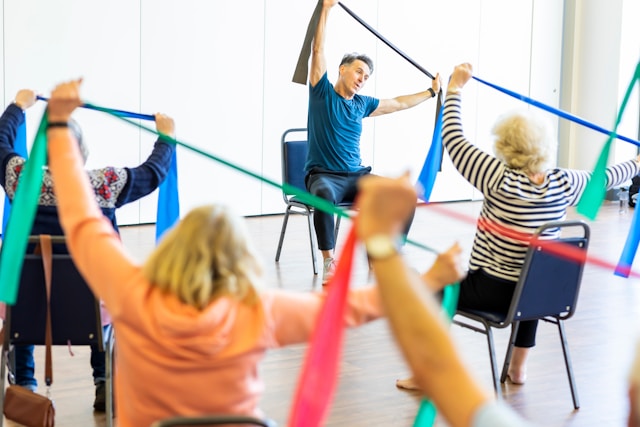
Engaging Care Home Activities That Enrich Residents’ Lives
Choosing the right care home is about so much more than finding a comfortable place to live, as it also involves understanding the necessary care and support required . For many families across the UK, it’s just as important to ensure that loved ones can enjoy a fulfilling and engaging lifestyle in their new home. That’s why activities in nursing care homes play such a vital role in daily life.
Modern UK care homes offer a vibrant range of activities and services designed to support residents’ wellbeing, independence, and happiness. From arts and crafts sessions to gentle exercise classes and lively social events, these activities help residents stay connected, active, and mentally stimulated. Whether someone enjoys gardening, music, or simply a good chat over a cup of tea, there’s something for everyone. According to a leading care home review, potential residents' families prioritise high-quality care services and a well-thought-out activities programme when looking for personalised care for their loved one.
At the heart of every quality care home is a commitment to person-centred care. This means activities are thoughtfully planned and tailored to suit each resident’s interests, abilities, and needs, including those living with dementia. The Care Inspectorate recognise the importance of offering a variety of activities in a UK care home to enrich the lives of residents every day.
Why Are Activities Important in Care Homes?
Engaging activities are at the heart of life in any good care home that provides exceptional care. They do far more than simply fill the day—they play a crucial role in supporting residents’ physical, mental, and emotional wellbeing. Regular participation in meaningful activities can help maintain independence, boost self-esteem, and provide a sense of purpose.
Social interaction is especially important for older adults, helping to reduce feelings of loneliness and isolation. Group activities in a welcoming home, such as quizzes, music sessions, or coffee mornings, encourage residents to build friendships and stay connected with others. For many, these moments of laughter and conversation quickly become highlights of the week.
Physical activities—whether it’s a gentle exercise class or a walk in the garden—help residents stay mobile and support overall health. Creative and cognitive activities, like arts and crafts or memory games, stimulate the mind and can be tailored by care staff to suit all abilities, including those living with dementia, and those temporarily enjoying respite care at a home.
Most importantly, a person-centred approach ensures that activities are chosen with residents’ individual interests and preferences in mind. This not only makes each day more enjoyable but also helps every resident feel valued and included in the care home community.
Types of Activities Offered in a Residential Nursing Home
Care homes across the UK provide a diverse range of activities to ensure every resident can find something enjoyable and meaningful. These activities are thoughtfully designed to cater to different interests, abilities, and needs, supporting both physical and mental wellbeing.
Social Activities
Social events are a cornerstone of care home life. Residents can take part in group activities such as day trips, coffee mornings, quiz nights, and bingo sessions, which help foster friendships and create a lively community atmosphere. Seasonal celebrations, birthday parties, and themed events also bring everyone together, making each week feel special and inclusive.
Creative and Artistic Activities
Creative pursuits are a wonderful way for residents to express themselves and try something new. Many care homes offer arts and crafts sessions, painting workshops, and music or singing groups. Baking classes and cookery demonstrations are also popular, giving residents the chance to share favourite recipes and enjoy delicious treats together, in a well managed care home. Differentiating activities is never too much trouble for activities coordinators as looking after the whole group's well being is very important in planning a good activities programme.
Physical and Outdoor Activities
Staying active is important at any age. Care homes provide a variety of gentle exercise classes and facilities , including chair yoga, stretching, and balance exercises, all tailored to suit different mobility levels. Outdoor activities such as gardening, walking groups, and lawn games encourage residents to enjoy fresh air and nature, promoting both physical health and a sense of wellbeing and encouraging community members to make strong connections.
Cognitive and Dementia-Friendly Activities
Mental stimulation is key to maintaining cognitive health, especially for those living with dementia. Care homes often organise memory games, puzzles, and reminiscence sessions designed to spark conversation and recall. Sensory activities, music therapy, and pet therapy are also offered to engage residents in a calming and supportive environment.
By offering such a wide variety of daily activities, care homes ensure that every resident has opportunities to stay engaged, active, and connected, making each day vibrant and rewarding.
How Are Activities Planned and Personalised?
A truly engaging activities programme in a care home doesn’t happen by chance—it’s the result of thoughtful planning, collaboration, and a deep understanding of each resident’s unique needs. Here’s how care homes ensure their activities are both meaningful and accessible to everyone.
Involving Residents in Planning and Choosing Activities
Resident involvement is at the heart of successful activity planning. Care homes regularly seek input from residents about their interests, hobbies, and suggestions for new activities. This might happen through informal chats, regular meetings, or resident committees dedicated to social events. By listening to residents’ preferences, care teams can organise sessions that genuinely excite and motivate participants. This collaborative approach not only empowers residents but also helps foster a sense of ownership and community within the home, particularly when welcoming new residents.
Adapting Sessions for Different Levels of Mobility and Cognitive Ability
Every resident has their own strengths and challenges, so activities are carefully adapted to suit a wide range of abilities. For those with limited mobility, care teams offer seated exercise classes, table-top games, and creative crafts that can be enjoyed from the comfort of a chair or wheelchair. Similarly, for residents living with dementia or other cognitive conditions, sessions are designed to be dementia-friendly, using clear instructions, familiar music, and sensory experiences to ensure everyone can participate with confidence. This inclusive approach means no one is left out, and each individual can enjoy activities at their own pace.
Importance of Flexibility and Variety in the Weekly Schedule
A varied and flexible activities schedule is essential for keeping life in a care home interesting and engaging. Care teams regularly review and update the weekly timetable, introducing new ideas alongside much-loved favourites. Flexibility is key, if residents’ needs or preferences change, the programme can be quickly adjusted. This ensures that everyone has the opportunity to try something new, revisit cherished pastimes, and enjoy a balanced mix of social, creative, physical, and cognitive activities throughout the week.
By involving residents, adapting sessions, and maintaining a flexible, varied schedule, care homes create a vibrant and inclusive environment where every individual can thrive.
The Benefits of a Vibrant Activities Programme
A well-planned activities programme brings a wealth of benefits to residential care home residents, touching every aspect of their wellbeing. These activities are much more than simple pastimes—they are an essential part of daily life that help residents feel connected, valued, and fulfilled.
Improved Mood and Mental Wellbeing
Taking part in group activities or creative sessions can lift spirits and reduce feelings of loneliness. Social interaction is known to boost mood, encourage laughter, and help residents form meaningful friendships. For many, joining in with music, art, or reminiscence sessions provides a welcome sense of joy and belonging.
Support for Physical Health
Regular movement is vital for maintaining strength, flexibility, and balance, especially as we age. Gentle exercise classes, gardening, and outdoor walks all help residents stay active in a safe and enjoyable way. These activities support mobility, reduce the risk of falls, and contribute to better overall health.
Enhanced Cognitive Function
Activities that challenge the mind, such as puzzles, quizzes, and memory games, are important for keeping the brain active. For residents living with dementia, tailored cognitive and sensory sessions can help stimulate memory and communication, offering comfort and reassurance.
Stronger Social Connections
A varied activities programme encourages residents to come together, share experiences, and build lasting relationships. Whether it’s a lively bingo night or a quiet chat over tea, these moments of connection foster a warm, supportive community within the home.
A Greater Sense of Purpose
Having a choice of activities gives residents the opportunity to pursue their interests and try new things. This sense of purpose and achievement is vital for self-esteem and overall happiness, helping each person to feel valued, engaged in daily life, and at peace.
Meaningful Activities at Ashlea Court Care Home
A vibrant activities programme is at the heart of life in any outstanding care home, enriching each day with purpose, connection, and joy. At Ashlea Court Care Home, we believe that every resident deserves the opportunity to enjoy a fulfilling lifestyle, whatever their interests or abilities.
Our dedicated Activities Team creates a varied and engaging programme tailored to the needs and preferences of our residents. From arts and crafts, baking, and music sessions to pet therapy, gardening, and gentle exercise, our activities are designed to support both physical and emotional wellbeing. Residents can enjoy quiet afternoons with puzzles, lively group sessions, or trips out in our minibus to explore the local area—there truly is something for everyone, at their own pace.
We pride ourselves on offering choice and flexibility, ensuring that each resident can participate in the activities that matter most to them. Our approach is person-centred, meaning we listen to our residents and adapt our programme to reflect their feedback and changing needs. Whether it’s a creative workshop, a social event, or simply a relaxing walk in our beautiful courtyard garden, every day at Ashlea Court is an opportunity to connect, discover, and thrive.
If you’d like to find out more about life at Ashlea Court and the activities we offer, we warmly invite you to get in touch or arrange a visit. Come and see for yourself how our welcoming community and well-planned activities programme can help your loved one feel right at home.
